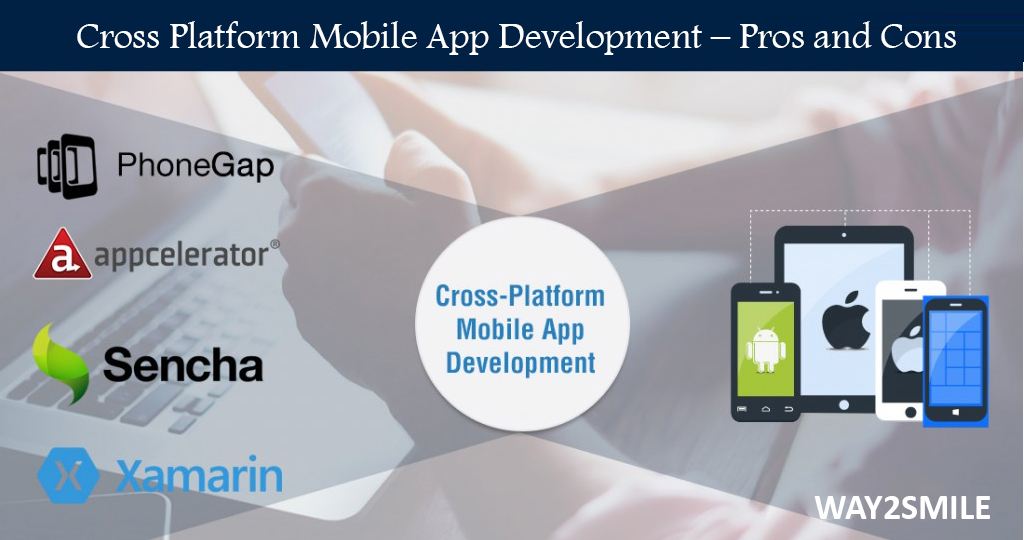Cross Platform Mobile App Development – Pros and Cons

The world is over mobile these days. It’s become a “must have” component for any organization, notwithstanding its size. Doubtless, some organizations will think about only 1 mobile OS (operating system) and avoid all the opposite ones, nonetheless, it’s vital for several businesses to concentrate on a pyramid of mobile devices with numerous operational systems. Gone are those days when you were glad about solely having a mobile app. Today, it’s vital that the app should support mechanical man gadgets, iPad, Windows Phone, Amazon Kindle, Tabs, BlackBerry, etc.
One of the foremost difficult things for some app developers is, whether or not to develop a native mobile app or choose cross-platform. Of course, as a business, you to manage different types of consumers. UN agency possesses different types of devices. Therefore, you’d got to have a mobile app that might work seamlessly on the majority of platforms (i.e. Android, iOS, Windows, etc.)
As long as there’s no clear winner within the platform wars, mobile app developers won’t accept either mechanical man or iOS development solely. The concept of targeting a wider audience is simply too enticing, and cross-platform app development tools build it easier and quicker for developers to deliver their apps to mechanical man, iOS further as less widespread platforms.
Still, several native app developers UN agency recognize their target platform’s rough tricks and specifics can’t, however, question the technology behind a cross-platform app. To shed some light-weight on things, we recommend taking a practical scrutinise the execs and cons of cross-platform mobile development over native one.
The Pros of cross-platform mobile development
Speed:

It is doubtless that it is quicker to develop a cross-platform mobile app instead of a native app for iOS and automaton. You’ll be able to leverage one codebase and customize for multiple platforms rather than making a replacement codebase for every platform. Creating one cross-platform app across all platforms is a lot more economical than building multiple native apps from scratch.
Costs:

In theory, it’s a lot of value effective to create a cross-platform answer for multiple platforms as a result of it leverages one codebases. This can be usually true unless the applying needs loads of customization for every platform.
Easy access to plugins:

Appcelerator and PhoneGap provide quick access to plugins that may simply be employed in different services or tools. These conjointly embrace providing common links to similar genus Apis, reminiscent of those for the devices’ cameras, accelerometers, or location sensors rather than writing distinctive code to speak to associate degree iPhone’s GPS and a Samsung Galaxy S II’s GPS, one centralized set of code is going to be mechanically changed to interface with each device.
Simple for net developers to use:

As a result of these frameworks area unit designed for scripting languages, they’re simple for net developers to utilize. HTML, CSS, and JavaScript area unit the backbone of the overwhelming majority of the net and apps that run on the net, therefore it’s a natural transition for these tools to migrate to the mobile devices.
Support for enterprise and cloud services:

These frameworks allow the straightforward integration of cloud services as an example, once associate degree Exchange integration is coded once, it’ll work on each platform. Also, multiple security ways are not required, as a result of the apps can perform equally on either the iOS or the automation platform.
Cons of cross-platform mobile development
Platform limitations:

Each platform has its own distinctive vogue and affords sure flexibilities missing in others. This could place you at an obstacle as a result of you’ll not be ready to leverage the distinctive practicality end tools of the individual native platform once developing an app for multiple platforms.
User Experience:

iPhone and golem operative systems, screen layouts, functions, etc. area unit totally different thus planning and developing a cross-platform app that gives an honest user expertise on 2 or additional platforms can beyond question be difficult. The bulk of self-made shopper apps area unit engineered on either Native iOS or golem. Let’s bear in mind that Facebook set out with a Cross-Platform mobile app however modified directions to Native iOS and golem once realizing the User expertise wasn’t optimum.
Integration challenges:

Integrating the app with preferences, native settings, and notification apps are often quite task. Various storage choices may additionally need partaking in a third-party cloud service. Clearly, there are heaps to contemplate once deciding whether or not to create native or cross-platform. Think about these professionals and cons once assessing your resources and also the level of experience of your team to form the choice easier.
All supporting options might not be enclosed in updates:
![]()
When Google, Apple, or Microsoft adds a brand new feature, the framework getting used can have to be compelled to be updated. only if the 2 languages area unit totally different, the communication “bridge” that the framework forms might not permit all items of data to pass. This is often an inherent challenge, which is able to hopefully notice its answer before long, though it’ll essentially continuously lag behind every official SDK.
Tools area unit restrictive:

Frameworks mandate that developers use prescribed tools and suites restricted to the code, that inherently needs the user to ignore their preferences and use one thing that they’ll be got to learn everywhere once more (that is that the worst-case scenario).
Slower code and render time:

Any cross-compilation method has the prospect to be slower; particularly since the user presumably will not be ready to use tools with that they are acquainted. Also, the code renders time is longer, as a result of it’ll get to churn out the code for every platform.
Wrapping up!
There is no doubt that cross-platform mobile application development has delivered immense benefits for enterprises, and small and medium business owners in terms of cost-effectiveness, saving time and money, and at last go-to-market faster. We at Way2Smile Solutions, a leading Mobile app development company in Chennai, successfully deliver over 100+ mobile applications for enterprises and SMEs and our highly-qualified developers can begin your mobile app development endeavour with the well-defined approach & right process to build an intuitive mobile application. Contact out experts now!
Email ID : bd@w2ssolutions.com / Contact Number: +91 73387 73388


